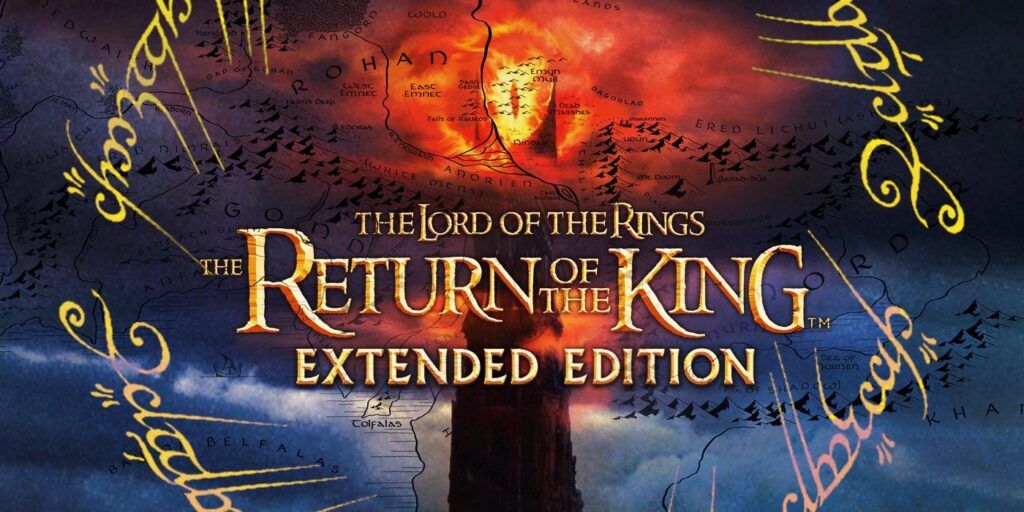One of the greatest strengths of The Return of the King is that, despite its epic scope and massive runtime focusing on the great battle for the fate of Middle-earth, it is somehow also able to emphasize the small and intimate personal moments that make the plot and characters the most compelling, as the story of The Lord of the Rings comes to its close. The dedication of Frodo and Sam is tested in different ways but to the limits of both characters. Aragorn finally takes up his destiny as the King of Gondor and shoulders all of the responsibility that comes with it. Merry and Pippin are separated for the first time in the story, and both have to develop without the support of the other. In many ways, the characters of the Fellowship are more separated and isolated than ever before, and it is because of this that each player in the story has more distinct character development than at any point before.
What can be lost in this impressive juggling act of characters and storylines, however, is one of the most dramatic story arcs in the entire movie: the internal struggle of King Théoden. Part of the reason that it is easy to overlook is due to the focus of the story. While The Two Towers focuses heavily on Rohan, Théoden, and the Battle of Helm’s Deep, The Return of the King shifts the drama from Rohan and Théoden to Gondor and the Steward Denethor. Théoden’s role consequently shifts, and his purpose in the story is more as an aid and support in the Battle of the Pelennor Fields than anything else.
The other major reason that it is easier to overlook Théoden’s dramatic storyline in The Return of the King is that the theatrical cut of the film eliminates one of the most important scenes that sets up Théoden’s struggle in the first place. The outline of his drama is present in the theatrical cut but only becomes fully understandable with the scenes included in the Extended Edition. The scene in question is the conversation with Saruman at the very beginning of The Return of the King, and it provides a context that shapes almost all of Théoden’s subsequent actions in the story.
In the scene in question, Gandalf, Théoden, and others come to question the defeated Saruman, who has holed up in his fortress but addresses them from the top of his tower. While this scene has significant outcomes for the rest of the story and ends with the death of Saruman, when the wizard addresses Théoden, he ends by insulting the king, calling him a “lesser son of greater sires” and implies that Rohan has fallen into ruin under his rulership while denying that Théoden had any responsibility for the victory at Helm’s Deep. This is a comment that clearly cuts Théoden deeply, and one that he dwells upon for the rest of the film. It is evident in his next scene with Éowyn when he denies her praise by repeating Saruman’s line that the victory at Helm’s Deep did not belong to him.
Another layer added by these early scenes with Théoden is his concern with the past. He royally intones “Hail the victorious dead!” at the celebration of the victory, voicing his own respect for the deeds of older generations and their heroism. But he also gradually reveals that he fears that he and his own time do not measure up to the heroism of his storied ancestors. He is torn between the two sides of his character – drawn on the one side by the call of ancient heroism, and on the other by the everyday practicality of ruling his kingdom. When he is told of the plight of Gondor, initially he responds, “Why should we go to the aid of those who did not come to ours? What do we owe Gondor?” His protective and pragmatic side makes a point: there is no practical obligation to go to the help of Gondor, and it looks like he will not take up that responsibility.
However, despite his initial reluctance, when Gondor does call for his help, the pull towards heroism again ignites and he leaps into action, calling out for the marshaling of all his forces. Whether consciously or not, when the intersecting concerns of heroism, practicality, and responsibility are all deadlocked in his unquiet conscience, the desperate situation of Gondor finally tips his character in one definitive direction.
As the rest of the story develops, this determination grows in intensity, accelerating towards the final climax of his character on the battlefield. Although he holds to his determination to help Gondor, he understands more and more that he does not have a strong enough force to break through the enemy forces. The practical concern gives him pause and his concern over the battle clearly grows as his horsemen ride closer and closer to the city of Minas Tirith. Strangely enough, however, with his growing practical concern also comes a growing determination to follow through on the commitment he has made in deciding to come to Gondor’s aid.
With the growth of both of these opposing forces weighing on Théoden’s mind, the climax of his character comes as his Rohirrim crest the final hill and see the battlefield laid out in front of them. While many have sung the accolades of the magnificent scene that is the charge of the Rohirrim in The Return of the King, one moment in that glorious sequence that is easy to overlook is the momentary hesitation on the part of Théoden, as he looks out over the massive armies of Mordor, as if considering one last time if he is doing the right thing. The scene in the movie is heightened by its description in the book: “The king sat upon Snowmane, motionless, gazing upon the agony of Minas Tirith, as if stricken suddenly by anguish, or by dread.”
Finally, though, he makes his decision, and his resolution is clear. The two motivations and concerns growing in his mind have reached their peak. What was once merely a foreboding that he could not win the battle has now become a certainty: he sees the evidence of his insufficient numbers right before his eyes. But despite that certainty, he charges into battle nonetheless, rallying his cavalry and leading them from the front, shouting out the certainty for all to hear: “Death! Death! Death!” It is part of the great emotional swell of the scene, accompanied by ’s magnificent score, but the emotional weight of the scene is heightened in this final decisive climax by Théoden’s choice.
His final moments, after this decision, give the resolution to the interior drama he has endured for the entire film. With the intersecting pulls of duty, heroism, and practicality, Théoden ends ultimately with hope – hope for the future of his people – as the scene is framed around his conversation with Éowyn, who he hopes will lead his people after his death. But, he also hopes for himself and the greatness of those who came before: “I go to my fathers, in whose mighty company I shall not now feel ashamed.” It is a moving scene on its own, but only reaches its full significance if you reflect on the concerns that began Théoden’s story of The Return of the King in the first place. The deep cut made by the comment of Saruman has finally been decisively answered.
Ultimately, Théoden plays into many themes of the overall story, primarily in its images of rulership, heroism, hope, and despair. In many ways, he plays off as a foil to Denethor, meeting a heroic and hopeful end where the Steward of Gondor gives in to despair. Heroism, honor, and salvation are all part of the intricate juggling act that is the plot of the movie itself, seen even in the redemptive deeds of the Army of the Dead who redeem their honor to gain final peace for their restless souls. In Théoden, though, The Return of the King plays out a desperate conflict that runs deeply in his mind, which can only be fully appreciated with an understanding of where it all began.
Patrick Lyon
(5 Articles Published)
I am Patrick Lyon, and I write for Collider. I also teach Latin and Literature on the high school level, and have been a lifelong fan of the works of Tolkien.
More
From Patrick Lyon
I am Patrick Lyon, and I write for Collider. I also teach Latin and Literature on the high school level, and have been a lifelong fan of the works of Tolkien.
This content was originally published here.




